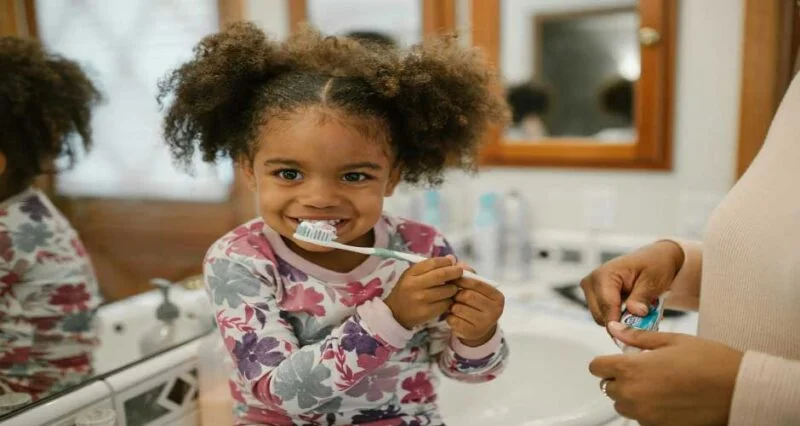
Children’s oral health and general well-being depends on the establishment of a solid dental hygiene routine. Here’s how you can establish a dental hygiene routine for your growing child.
Understanding the Importance of Early Dental Care
Early dental care is essential for many reasons. It first establishes behaviors for lifetime dental health. Dental hygiene is ingrained in youngsters from an early age when they are taught how to brush and floss correctly. Early dental appointments also aid in the detection of possible problems before they worsen, such as cavities or misaligned teeth. Regular examinations by a pediatric dentist in Oceanside, or in your area, can discern if your child’s teeth are growing properly and that issues can be quickly treated and resolved.
Furthermore, kids who start going to the dentist early usually experience less worry and fear. A willingness to maintain routine dental checkups throughout life and more positive experiences can result from this familiarity with dental care. Early dental care also teaches parents and kids about the foods that support strong, healthy teeth and stresses the significance of a balanced diet and its impact on oral health.
Choosing the Right Dental Products
A vital step in creating a dental hygiene regimen for kids is choosing the right dental products. Since children’s teeth are more sensitive than those of adults, it’s critical to select a toothbrush with soft bristles that can thoroughly clean without endangering their fragile gums. Little children benefit greatly from toothbrushes with small heads and handles that are easy to grip since they can comfortably reach all parts of the mouth.
In terms of toothpaste, it is advised to use fluoride toothpaste to assist in strengthening tooth enamel and ward off cavities. Nonetheless, the quantity of fluoride toothpaste applied ought to be suitable for the child’s age; for instance, a smear should be used for kids under three and a pea-sized amount for kids between three and six. Encouraging children to spit out their toothpaste instead of swallowing it and making sure they use the recommended amount are two important aspects of child supervision during brushing.
Establishing a Brushing Routine
Establishing a regular brushing schedule is essential to making sure kids form healthy dental habits. Children should brush their teeth at least twice a day, preferably in the morning and right before bed. Parents should provide a lot of guidance and supervision while their children brush their teeth.
Making tooth brushing a game or implementing a reward system is an entertaining and interesting technique to get kids to do it. For instance, using a two-minute hourglass or a timer might assist kids in understanding how long brushing should take. To make brushing more enjoyable, there are a ton of apps available that have entertaining characters and music. Giving kids stickers or a tiny gift as a reward for brushing their teeth on a regular basis will help encourage them to maintain their schedule.
Incorporating Flossing and Mouthwash
A child should begin flossing as soon as two teeth come into contact. This aids in cleaning plaque and food residue from places that a toothbrush cannot reach. Until a child is old enough to brush their teeth on their own, which is often about age ten, parents should continue to help their children floss their teeth. Children can better grasp the necessity of flossing if proper technique is demonstrated and the importance of flossing is explained.
A child who wears braces or is prone to cavities can find mouthwash to be a helpful supplement to their oral hygiene regimen. It’s crucial to select a mouthwash that is alcohol-free and made especially for kids, though. To make sure that kids don’t swallow mouthwash, parents should watch over their use. Mouthwash should not be used in place of brushing and flossing, but it can help minimize bacteria in the mouth and improve breath.
Encouraging Healthy Eating Habits
Dental health is significantly influenced by diet. Strong, healthy teeth can be encouraged in kids by eating a balanced diet rich in fruits, vegetables, and whole grains. Foods high in calcium, such as cheese, yogurt, and milk, are especially good for growing teeth and bones. Reducing sugar-filled foods and beverages is also essential because sugar promotes cavities and tooth decay.
By incorporating kids in the planning and preparation of meals, parents can increase the attractiveness of eating healthily. Encouraging kids to learn about how various foods affect their teeth might help them make better decisions. Providing wholesome snacks like cheese cubes, carrot sticks, and apple slices can lower dental risk and improve general health.
Conclusion
Establishing a dental hygiene routine for kids is essential to their general health and welfare. Parents can assist their children in forming lifelong healthy habits by following the tips above. Children can have strong, healthy teeth and a self-assured grin with a solid dental hygiene routine.

